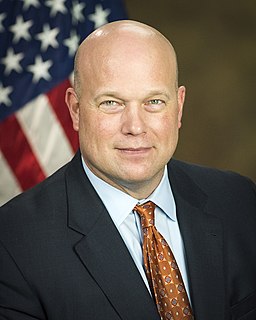A Quote by Greg Abbott
During my time as a judge, as a justice, and as attorney general, I've had one overarching goal, and that is a strict interpretation and application of the laws and the Constitution. I would be Madisonian.
Related Quotes
When I was sworn in as a judge of the court of appeals, I took an oath. I put my hand on the Bible and I swore that I would administer justice without respect to persons, that I would do equal right to the poor and to the rich, and that I would carry out my duties under the Constitution and the laws of the United States.
What disturbed me most, frankly, about the Rod Rosenstein memo, is the fact it was addressed to the attorney general. The attorney general was supposed to have recused himself from anything involving Russia. And here he is recommending the firing of the top cop doing the Russia investigation, in clear violation of what he had, the attorney general, had committed to doing.
I'm not naive. Sometimes interpretation is more of an art than a science. There are those who would label interpretation absolutely anything a judge might do or, two, the text of a statute or the Constitution. But it seems to me there comes a point where a judge is using his own creativity and purpose and crosses the line between interpreting a text written by somebody else and in a sense creating something new.
[T]he Constitution ought to be the standard of construction for the laws, and that wherever there is an evident opposition, the laws ought to give place to the Constitution. But this doctrine is not deducible from any circumstance peculiar to the plan of convention, but from the general theory of a limited Constitution.
The constitution of the United States is to receive a reasonable interpretation of its language, and its powers, keeping in view the objects and purposes, for which those powers were conferred. By a reasonable interpretation, we mean, that in case the words are susceptible of two different senses, the one strict, the other more enlarged, that should be adopted, which is most consonant with the apparent objects and intent of the Constitution.

































